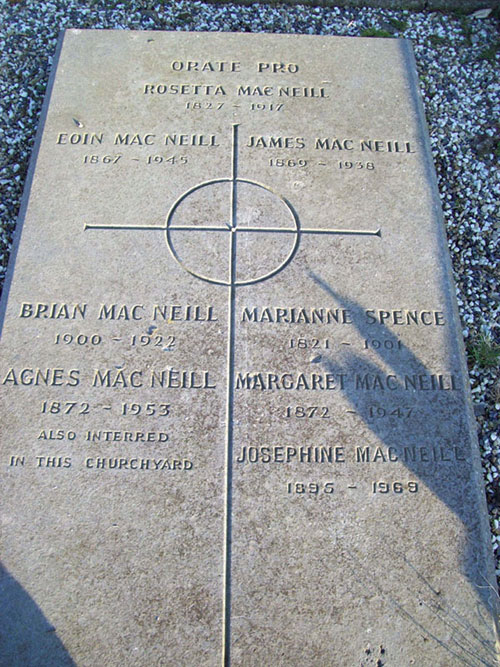Eoin McNeill
McNeill advocated the formation of a national volunteer force on the lines of the Ulster Volunteer Force. The organisation was established in Dublin on 25 November, its ostensible purpose being to safeguard Home Rule; a number of the executive, however, were members of the Irish Republican Brotherhood who aimed at using the Volunteers to gain full independence, which indeed came to pass, most of the participants in the 1916 Rising being members of the Volunteers. MacNeill, also a separatist but moderate in tone and well regarded publicly, was given the role of chief of staff.
Under MacNeill’s direction recruitment proceeded apace, the numbers eventually reaching 170,000. He also encouraged the creation of a complementary women’s force, Cumann na mBan, in April 1914. As chief of staff, he was involved in planning the importation of the Howth arms. Following the split in September 1914 and the defection of the vast majority of members to Redmond, the remaining Irish Volunteers, numbering about 10,000 and mainly located in Dublin, continued under MacNeill’s leadership. Many in this new and trimmed-down force of Irish Volunteers had little regard for Home Rule, the majority being committed republicans.
MacNeill’s strategy was to organise an insurrection if there were adequate reasons and when circumstances seemed favourable; in the meantime, the Irish Volunteers should be fully armed, trained, and held in readiness to counter any attempt to disarm the organisation, impose conscription, or abandon Home Rule. Some of the IRB faction in the leadership, however, planned an insurrection for the more immediate future. It organised routine manoeuvres for Easter Sunday 1916 as a cover for an insurrection throughout the country. Learning of this on Easter Thursday, MacNeill confronted Patrick Pearse, one of the IRB ringleaders, telling him that he would not allow ‘a half-armed force to be called out’. Later, however, Pearse, Thomas MacDonagh and Seán MacDiarmada allayed his fears, informing him of the imminent landing of a German ship with substantial quantities of arms at Fenit, Co. Kerry. When it transpired on Saturday evening that the ship had sunk and the arms were lost, MacNeill countermanded the order for manoeuvres the following day.
As a result of MacNeill’s countermand, the 1916 Rising was almost entirely confined to Dublin; even there, the numbers were only about a quarter of what they might otherwise have been. The countermand probably did not materially affect the outcome: even the entire Irish Volunteers force, as it then was (10,000 men), could not have withstood the military might which would have been deployed against it. In the event, MacNeill’s action probably saved many lives. On the other hand, if it were not for the countermand, the British might well have prevented the Rising from taking place, thus ensuring that there was no loss of life; once they believed that the manoeuvres were off the British became complacent and in effect allowed the Rising to go ahead. MacNeill took no part in the Rising. Nevertheless, he was tried by court-martial and sentenced to penal servitude for life; he was released under amnesty in June 1917.
March 3rd 2014. One hundred years ago today, Eoin MacNeill, professor of early and medieval history at UCD and one of the leading lights of the Irish language revival movement, published an article entitled The North Began in An Claidheamh Soluis, the newspaper of the Gaelic League. It called for the formation of an Irish Volunteer force to emulate the Ulster Volunteer Force established in January 1913. MacNeill was subsequently approached by Irish separatists associated with the Irish Republican Brotherhood (IRB) and asked to take the lead in forming the Irish Volunteers. It was launched in Dublin on 25 November 1913, with MacNeill as commander-in-chief.
Violence
Regardless of the effectiveness of his leadership, MacNeill’s decisive role in the formation of the Volunteers is a significant legacy – and given that the Volunteers metamorphosed into the IRA that fought the War of Independence, his stance on violence is particularly worthy of assessment.
He insisted in February 1916 “what we call our country is not a poetical abstraction . . . it is our duty to get our country on side and not be content with the vanity of thinking ourselves to be right and other Irish people to be wrong”. That contention went to the heart of the controversies of nationalist Ireland a century ago and MacNeill’s 1913 initiative and what followed need to be seen in the context of different and evolving concepts of Irish nationalism; definitions of loyalty and legitimate violence were contested during this period of multiple allegiances and the outbreak of the Great War complicated them further.
In relation to his role in the Volunteers, these are the lenses through which we should view MacNeill, his dilemmas and his legacy. – Diarmaid Ferriter is professor of modern Irish history at UCD

